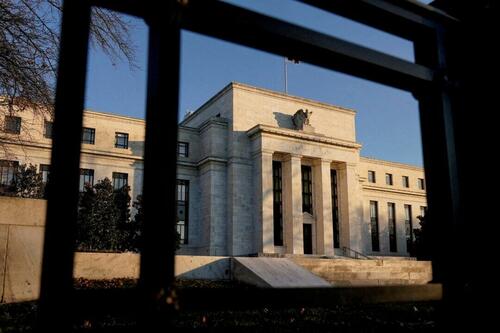
ФРС снижает «репутационный риск» от банковских экзаменов на фоне негативной реакции на дебанкинг
Автор Tom Ozimek via Эпохальные времена,
23 июня Федеральная резервная система объявила, что больше не будет учитывать «риск репутации» в своих банковских экспертизах, что согласуется с усилиями республиканских законодателей и администрации Трампа по борьбе с тем, что они называют политически мотивированной финансовой дискриминацией, особенно дебанковской.

Центральный банк заявил, что начал пересматривать свои надзорные материалы, чтобы удалить ссылки на репутационный риск, заменив их, где это уместно, более конкретными обсуждениями финансового риска.
В своем заявлении от 23 июня ФРС заявила, что начала процесс рассмотрения ссылок на репутационный риск в своих надзорных материалах и замены их, когда это необходимо, более конкретными обсуждениями финансового риска.
«Это изменение не меняет ожиданий совета директоров о том, что банки поддерживают сильное управление рисками для обеспечения безопасности и надежности, а также соблюдения закона и регулирования», — говорится в заявлении ФРС.
Это решение знаменует собой значительный сдвиг в том, как регуляторы оценивают банки, особенно по мере усиления контроля над заявлениями о том, что некоторые учреждения отказывают в услугах законным предприятиям, таким как криптовалютные фирмы, религиозные организации или политические группы, на основе субъективных опасений по поводу ущерба репутации.
Хотя банки, как правило, имеют широкую свободу действий в отношении отношений по счетам, критики утверждают, что использование репутационного риска может маскировать дискриминационные решения. Эти опасения подпитывают растущие двухпартийные призывы обеспечить справедливый доступ к финансовым услугам.
«Так работает дебанковское дело», — сказал Джереми Тедеско, старший советник Alliance Defending Freedom (ADF), в интервью The Epoch Times в 2023 году. «Банк закрывает счета, не дает четкой причины и ссылается на какую-то политику терпимости к риску для отрицания в обстоятельствах, которые выглядят очень подозрительно, как это было из-за ваших религиозных или политических взглядов. "
Законодатели приняли закон, направленный на борьбу с финансовой дискриминацией. В марте сенатор Тим Скотт (R-S.C.), например, ввел Закон о справедливом доступе к банковскому делу (FIRM Act), который запрещает федеральным регуляторам наказывать или оказывать давление на финансовые учреждения на основе репутационного риска. Двухпартийная версия Дома была введена в следующем месяце Репсом. Энди Барр (R-Ky.) и Ричи Торрес (D-N.Y.).
Слишком долго неизбранные регуляторы использовали расплывчатую и субъективную концепцию репутационного риска, чтобы подтолкнуть политическую идеологию под видом банковского надзора. Об этом Барр заявил в своем заявлении. «Закон о ФИРМ восстанавливает нейтралитет и целостность нашей системы финансового регулирования и защищает право всех американцев на доступ к банковским услугам, не опасаясь незаконной дискриминации. "
Этот шаг ФРС согласовывает его с другими банковскими регуляторами, которые недавно предприняли аналогичные действия. В марте Управление контролера валюты (OCC) заявило, что удалит ссылки на репутационный риск из своих руководств и руководящих документов.
OCC никогда не использовала репутационный риск в качестве универсального оправдания для надзорных действий. Об этом говорится в заявлении агентства. Тем не менее, ОКС считает, что устранение ссылок на репутационный риск повысит прозрачность и доверие к надзорному процессу. "
Несколько дней спустя, Трэвис Хилл, исполняющий обязанности председателя Федеральной корпорации по страхованию вкладов (FDIC), проинформировал Конгресс, что агентство также устранит репутационный риск как самостоятельный фактор, назвав его концепцией, которая «была использована в прошлом» и не добавляет «никакой ценности с точки зрения безопасности и надежности». "
Во время апрельской речи на саммите Американской ассоциации банкиров Хилл сказал, что FDIC разрабатывает правило, которое прямо запрещает руководителям критиковать или предпринимать действия против банков на основе репутационного риска, особенно если это связано с политическими, религиозными или социальными взглядами клиентов.
Мы также изучаем дополнительные идеи, чтобы полностью положить конец дебанковской деятельности. Хилл сказал. «В целом мы уделяем приоритетное внимание обеспечению того, чтобы наш подход к регулированию способствовал динамичной, растущей экономике и в то же время способствовал созданию безопасной, надежной и устойчивой банковской системы. "
Председатель Федеральной резервной системы Джером Пауэлл также признал серьезность проблемы. Ранее в этом году он сказал законодателям во время слушаний в Конгрессе, что ФРС «свежий взгляд» на сообщения о дебанковской деятельности, отметив, что он был «потрясен растущим числом случаев», когда физическим лицам или предприятиям якобы было отказано в финансовых услугах.
Пауэлл предположил, что чрезмерное регулирование и повышенное неприятие риска могут быть факторами, и сказал, что этот вопрос заслуживает более тщательного изучения.
Тайлер Дерден
Мон, 06/23/2025 - 21:45










![Przedświąteczne kontrole policjantów i strażników leśnych. Sprawdzają legalność choinek i drewna [zdjęcia]](https://tkn24.pl/wp-content/uploads/2025/12/Wspolne-kontrole-policjantow-i-straznikow-lesnych-2.jpg)



